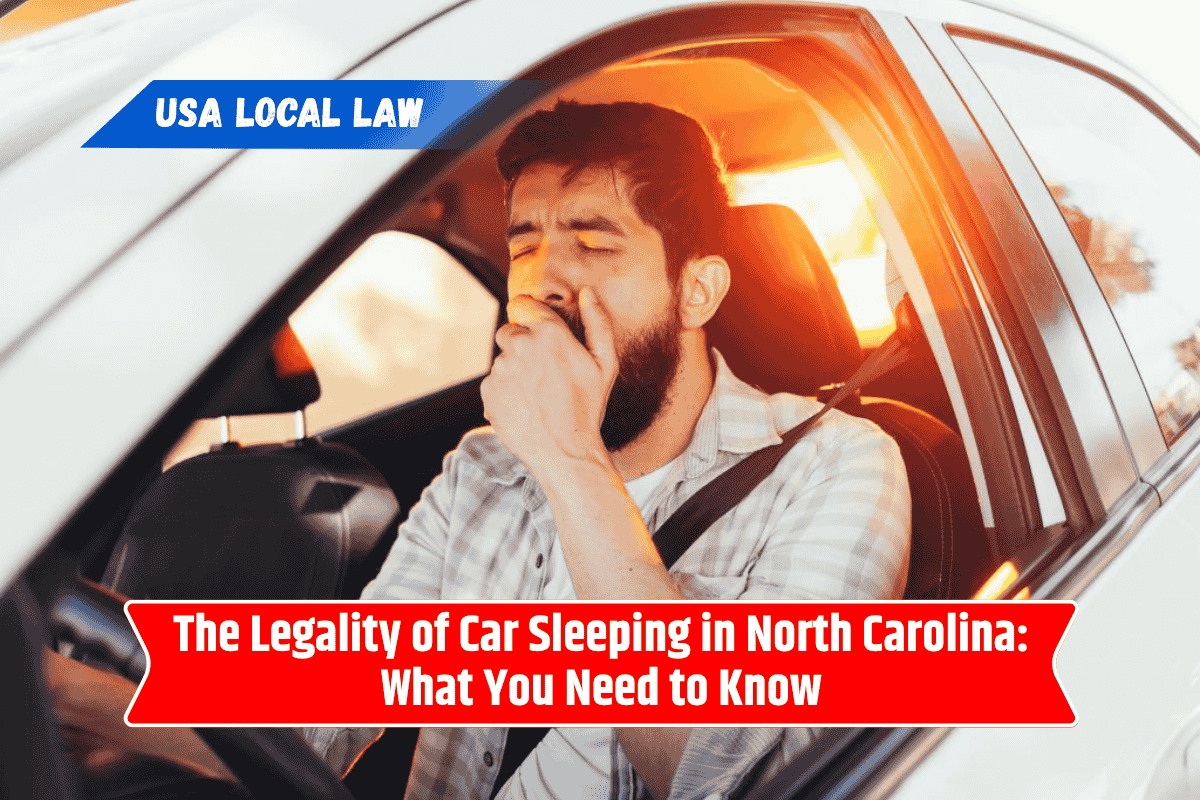Sometimes, whether you’re on a road trip, facing an emergency, or don’t have another place to stay, sleeping in your car becomes the only option. But is it legal to sleep in your car in North Carolina?
The answer isn’t simple — it depends on where, when, and how you do it. This article breaks down everything you need to know about car sleeping laws in North Carolina in simple words.
Is Sleeping in Your Car Illegal in North Carolina?
There is no statewide law in North Carolina that bans sleeping in your car. So technically, it is not illegal. However, where you choose to park and sleep can make a big difference. Some areas allow it, while others may fine or tow you.
In short: car sleeping is legal, but only if you follow local rules and parking regulations.
Where Can You Legally Sleep in Your Car?
Here are some places where it’s usually safe and legal to sleep in your car:
Rest Areas:
North Carolina has several highway rest areas. These are good places for a quick nap. You are usually allowed to stay for a few hours, but overnight sleeping is not officially allowed. Still, many people take short rests here, especially for driver safety.
Walmart Parking Lots:
Some Walmart stores allow overnight parking. But not all do. You must ask the store manager for permission. If allowed, keep a low profile and don’t leave trash or make noise.
Private Campgrounds or Truck Stops:
Some truck stops and campgrounds allow overnight parking for a small fee or sometimes for free. Look for Love’s, Pilot, or Flying J stations with safe, designated parking spots.
Private Property (With Permission):
If you have a friend or family member’s permission, you can sleep in your car on their driveway or land.
Where You Should Avoid Sleeping in Your Car
There are some places where sleeping in your car may cause legal trouble:
City Streets and Neighborhoods:
In many cities, parking on the street overnight — especially in residential areas — can lead to complaints or even police asking you to move. Some cities have local ordinances against sleeping in vehicles.
School Zones, Parks, or Government Properties:
Avoid parking near schools or public parks overnight. These areas often have rules against loitering, especially after dark.
Downtown Areas:
Busy city areas often have time-limited parking rules, and some even have “no overnight parking” signs. If you’re caught breaking these rules, you could get fined or towed.
Can Police Ask You to Move?
Yes. If you’re parked in a place where overnight parking is not allowed, police officers have the right to knock on your window and ask you to move. They might not arrest you, but they can write a ticket or even tow your vehicle if you don’t follow the rules.
To avoid this, always check for posted signs, avoid staying in the same spot too long, and be respectful of local rules.
Tips for Safe and Legal Car Sleeping in NC
Keep your car parked in a safe, legal spot
Always keep your doors locked and windows slightly cracked for airflow
Don’t block driveways, fire lanes, or other vehicles
Keep things quiet and clean
Avoid alcohol or drug use while in your vehicle — even parked, this can lead to DUI charges in NC
What If You’re Homeless and Living in Your Car?
For those who are homeless and living in their car, North Carolina does have support organizations and shelters that can help. Some cities offer safe parking programs, and local charities may assist with food, hygiene, or finding housing. If this applies to you, contacting a local shelter or help line could offer safer and longer-term options.
Sleeping in your car in North Carolina is not illegal by state law, but where you park makes all the difference. Rest areas are fine for short naps, and some businesses like Walmart may allow it with permission. However, sleeping in neighborhoods or public areas without approval can lead to tickets or police interaction.
Always follow local signs, check for permission, and avoid places with “no overnight parking” rules. If done carefully and respectfully, sleeping in your car in North Carolina can be a safe and temporary option when needed.
